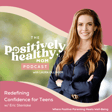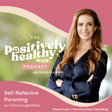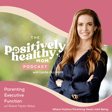
Personality Change Science
Welcome to The Positively Healthy Mom Podcast! I'm Laura Ollinger, and today, I’m thrilled to welcome Shannon Sauer-Zavala, a licensed clinical psychologist, and expert in the emerging field of Personality Change Science. Shannon is dedicated to helping people from all walks of life—whether they’re teenagers, parents, or college students—transform their mental health through her research-backed insights.
In this enlightening episode, Shannon delves into the fascinating world of Personality Change Science—exploring how we can reshape our personalities in ways that lead to healthier, more fulfilling lives. With her background as both a private practitioner and an academic researcher at the University of Kentucky, Shannon’s expertise offers a unique blend of hands-on experience and cutting-edge science. Her research is funded by the National Institute of Mental Health, ensuring that her strategies are grounded in the latest psychological advancements.
Shannon guides us through practical steps to apply Personality Change Science in our everyday lives. She’ll share how understanding the malleable aspects of our personalities can help us overcome mental health challenges and lead to meaningful personal growth. Whether you're a busy mom, a student, or a parent, Shannon’s tips will show you how to harness your potential for change and live more authentically.
Throughout the episode, Shannon also discusses the critical role personality plays in our emotional well-being and how intentional change can be the key to breaking negative patterns and fostering positive ones.
Key takeaways from this episode include:
- The science behind personality changes and how it can lead to better mental health and life satisfaction.
- How to incorporate small, actionable steps into your routine that align with your desired personality shifts.
- How Shannon’s work as a clinical psychologist and researcher offers groundbreaking insights that can support your journey toward personal growth.
Join us for this insightful conversation and discover how Shannon’s passion for Personality Change Science can inspire and guide you toward living a more balanced, empowered, and fulfilling life.












